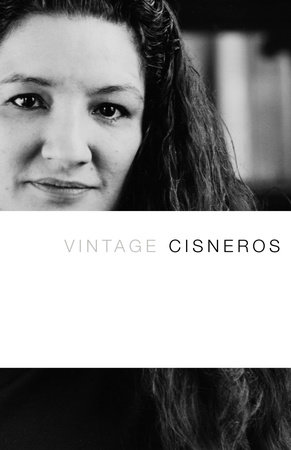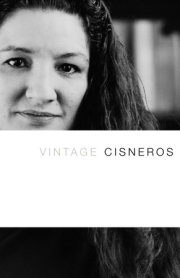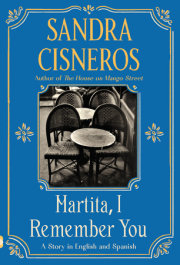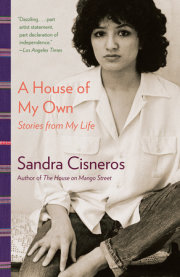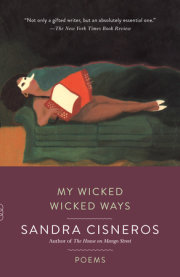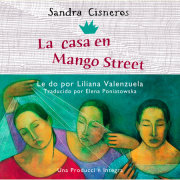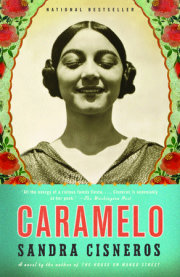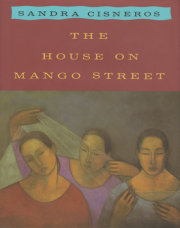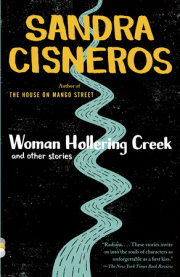HAIRS
Everybody in our family has different hair. My Papa's
hair is like a broom, all up in the air. And me, my hair is lazy. It never obeys barrettes or bands. Carlos' hair is thick and straight. He doesn't need to comb it. Nenny's hair is slippery-slides out of your hand. And Kiki, who is the youngest, has hair like fur.
But my mother's hair, my mother's hair, like little rosettes, like little candy circles all curly and pretty because she pinned it in pincurls all day, sweet to put your nose into when she is holding you, holding you and you feel safe, is the warm smell of bread before you bake it, is the smell when she makes room for you on her side of the bed still warm with her skin, and you sleep near her, the rain outside falling and Papa snoring. The snoring, the rain, and Mama's hair that smells like bread.
MY NAME
In English my name means hope. In Spanish it means too many letters. It means sadness, it means waiting. It is like the number nine. A muddy color. It is the Mexican records my father plays on Sunday mornings when he is shaving, songs like sobbing.
It was my great-grandmother's name and now it is mine. She was a horse woman too, born like me in the Chinese year of the horse-which is supposed to be bad luck if you're born female-but I think this is a Chinese lie because the Chinese, like the Mexicans, don't like their women strong.
My great-grandmother. I would've liked to have known her, a wild horse of a woman, so wild she wouldn't marry. Until my great-grandfather threw a sack over her head and carried her off. Just like that, as if she were a fancy chandelier. That's the way he did it.
And the story goes she never forgave him. She looked out the window her whole life, the way so many women sit their sadness on an elbow. I wonder if she made the best with what she got or was she sorry because she couldn't be all the things she wanted to be. Esperanza. I have inherited her name, but I don't want to inherit her place by the window.
At school they say my name funny as if the syllables were made out of tin and hurt the roof of your mouth. But in Spanish my name is made out of a softer something, like silver, not quite as thick as sister's name-Magdalena-which is uglier than mine. Magdalena who at least can come home and become Nenny. But I am always Esperanza.
I would like to baptize myself under a new name, a name more like the real me, the one nobody sees. Esperanza as Lisandra or Maritza or Zeze the X. Yes. Something like Zeze the X will do.
OUR GOOD DAY
If you give me five dollars I will be your friend forever. That's what the little one tells me.
Five dollars is cheap since I don't have any friends except Cathy who is only my friend till Tuesday.
Five dollars, five dollars.
She is trying to get somebody to chip in so they can buy a bicycle from this kid named Tito. They already have ten dollars and all they need is five more.
Only five dollars, she says.
Don't talk to them, says Cathy. Can't you see they smell like a broom.
But I like them. Their clothes are crooked and old. They are wearing shiny Sunday shoes without socks. It makes their bald ankles all red, but I like them. Especially the big one who laughs with all her teeth. I like her even though she lets the little one do all the talking.
Five dollars, the little one says, only five.
Cathy is tugging my arm and I know whatever I do next will make her mad forever.
Wait a minute, I say, and run inside to get the five dollars. I have three dollars saved and I take two of Nenny's. She's not home, but I'm sure she'll be glad when she finds out we own a bike. When I get back, Cathy is gone like I knew she would be, but I don't care. I have two new friends and a bike too.
My name is Lucy, the big one says. This here is Rachel my sister.
I'm her sister, says Rachel. Who are you?
And I wish my name was Cassandra or Alexis or Maritza-anything but Esperanza-but when I tell them my name they don't laugh.
We come from Texas, Lucy says and grins. Her was born here, but me I'm Texas.
You mean
she, I say.
No, I'm from Texas, and doesn't get it.
This bike is three ways ours, says Rachel who is thinking ahead already. Mine today, Lucy's tomorrow and yours day after.
But everybody wants to ride it today because the bike is new, so we decide to take turns
after tomorrow. Today it belongs to all of us.
I don't tell them about Nenny just yet. It's too complicated. Especially since Rachel almost put out Lucy's eye about who was going to get to ride it first. But finally we agree to ride it together. Why not?
Because Lucy has long legs she pedals. I sit on the back seat and Rachel is skinny enough to get up on the handlebars which makes the bike all wobbly as if the wheels are spaghetti, but after a bit you get used to it.
We ride fast and faster. Past my house, sad and red and crumbly in places, past Mr. Benny's grocery on the corner, and down the avenue which is dangerous. Laundromat junk store, drugstore, windows and cars and more cars, and around the block back to Mango.
People on the bus wave. A very fat lady crossing the street says, You sure got quite a load there.
Rachel shouts, You got quite a load there too. She is very sassy.
Down, down Mango Street we go. Rachel, Lucy, me. Our new bicycle. Laughing the crooked ride back.
THOSE WHO DON'T
Those who don't know any better come into our neighborhood scared. They think we're dangerous. They think we will attack them with shiny knives. They are stupid people who are lost and got here by mistake.
But we aren't afraid. We know the guy with the crooked eye is Davey the Baby's brother, and the tall one next to him in the straw brim, that's Rosa's Eddie. V., and the big one that looks like a dumb grown man, he's Fat Boy, though he's not fat anymore nor a boy.
All brown all around, we are safe. But watch us drive into a neighborhood of another color and our knees go shakity-shake and our car windows get rolled up tight and our eyes look straight. Yeah. That is how it goes and goes.
DARIUS & THE CLOUDS
You can never have too much sky. You can fall asleep and wake up drunk on sky, and sky can keep you safe when you are sad. Here there is too much sadness and not enough sky. Butterflies too are few and so are flowers and most things that are beautiful. Still, we take what we can get and make the best of it.
Darius, who doesn't like school, who is sometimes stupid and mostly a fool, said something wise today, though most days he says nothing. Darius, who chases girls with firecrackers or a stick that touched a rat and thinks he's tough, today pointed up because the world was full of clouds, the kind like pillows.
You all see that cloud, that fat one there? Darius said, See that? Where? That one next to the one that look like popcorn. That one there. See that. That's God, Darius said. God? somebody little asked. God, he said, and made it simple.
THE FAMILY OF LITTLE FEET
There was a family. All were little. Their arms were little, and their hands were little, and their height was not tall, and their feet very small.
The grandpa slept on the living room couch and snored through his teeth. His feet were fat and doughy like thick tamales, and these he powdered and stuffed into white socks and brown leather shoes.
The grandma's feet were lovely as pink pearls and dressed in velvety high heels that made her walk with a wobble, but she wore them anyway because they were pretty.
The baby's feet had ten tiny toes, pale and see-through like a salamander's, and these he popped into his mouth whenever he was hungry.
The mother's feet, plump and polite, descended like white pigeons from the sea of pillow, across the linoleum roses, down down the wooden stairs, over the chalk hopscotch squares, 5, 6, 7, blue sky.
Do you want this? And gave us a paper bag with one pair of lemon shoes and one red and one pair of dancing shoes that used to be white but were now pale blue. Here, and we said thank you and waited until she went upstairs.
Hurray! Today we are Cinderella because our feet fit exactly, and we laugh at Rachel's one foot with a girl's grey sock and a lady's high heel. Do you like these shoes? But the truth is it is scary to look down at your foot that is no longer yours and see attached a long long leg.
Everybody wants to trade. The lemon shoes for the red shoes, the red for the pair that were once white but are now pale blue, the pale blue for the lemon, and take them off and put them back on and keep on like this a long time until we are tired.
Then Lucy screams to take our socks off and yes, it's true. We have legs. Skinny and spotted with satin scars where scabs were picked, but legs, all our own, good to look at, and long.
It's Rachel who learns to walk the best all strutted in those magic high heels. She teaches us to cross and uncross our legs, and to run like a double-dutch rope, and how to walk down to the corner so that the shoes talk back to you with every step. Lucy, Rachel, me tee-tottering like so. Down to the corner where the men can't take their eyes off us. We must be Christmas.
Mr. Benny at the corner grocery puts down his important cigar: Your mother know you got shoes like that? Who give you those?
Nobody.
Them are dangerous, he says. You girls too young to be wearing shoes like that. Take them shoes off before I call the cops, but we just run.
On the avenue a boy on a homemade bicycle calls out: Ladies, lead me to heaven.
But there is nobody around but us.
Do you like these shoes? Rachel says yes, and Lucy says yes, and yes I say, these are the best shoes. We will never go back to wearing the other kind again. Do you like these shoes?
In front of the laundromat six girls with the same fat face pretend we are invisible. They are the cousins, Lucy says, and always jealous. We just keep strutting.
Across the street in front of the tavern a bum man on the stoop.
Do you like these shoes?
Bum man says, Yes, little girl. Your little lemon shoes are so beautiful. But come closer. I can't see very well. Come closer. Please.
You are a pretty girl, bum man continues. What's your name, pretty girl?
And Rachel says Rachel, just like that.
Now you know to talk to drunks is crazy and to tell them your name is worse, but who can blame her. She is young and dizzy to hear so many sweet things in one day, even if it is a bum man's whiskey words saying them.
Rachel, you are prettier than a yellow taxicab. You know that?
But we don't like it. We got to go, Lucy says.
If I give you a dollar will you kiss me? How about a dollar. I give you a dollar, and he looks in his pocket for wrinkled money.
We have to go right now, Lucy says taking Rachel's hand because she looks like she's thinking about that dollar.
Bum man is yelling something to the air but by now we are running fast and far away, our high heel shoes taking us all the way down the avenue and around the block, past the ugly cousins, past Mr. Benny's, up Mango Street, the back way, just in case.
We are tired of being beautiful. Lucy hides the lemon shoes and the red shoes and the shoes that used to be white but are now pale blue under a powerful bushel basket on the back porch, until one Tuesday her mother, who is very clean, throws them away. But no one complains.
HIPS
I like coffee, I like tea.
I like the boys and the boys like me.
Yes, no, maybe so. Yes, no, maybe so . . .One day you wake up and they are there. Ready and waiting like a new Buick with the keys in the ignition. Ready to take you where?
They're good for holding a baby when you're cooking, Rachel says, turning the jump rope a little quicker. She has no imagination.
You need them to dance, says Lucy.
If you don't get them you may turn into a man. Nenny says this and she believes it. She is this way because of her age.
That's right, I add before Lucy or Rachel can make fun of her. She is stupid alright, but she
is my sister.
But most important, hips are scientific, I say repeating what Alicia already told me. It's the bones that let you know which skeleton was a man's when it was a man and which a woman's.
They bloom like roses, I continue because it's obvious I'm the only one who can speak with any authority; I have science on my side. The bones just one day open. Just like that. One day you might decide to have kids, and then where are you going to put them? Got to have room. Bones got to give.
But don't have too many or your behind will spread. That's how it is, says Rachel whose mama is as wide as a boat. And we just laugh.
What I'm saying is who here is ready? You gotta be able to know what to do with hips when you get them, I say making it up as I go. You gotta know how to walk with hips, practice you know-like if half of you wanted to go one way and the other half the other.
That's to lullaby it, Nenny says, that's to rock the baby asleep inside you. And then she begins singing
seashells, copper bells, eevy, ivy, o-ver.
I'm about to tell her that's the dumbest thing I ever heard, but the more I think about it . . .
Copyright © 2004 by Sandra Cisneros. All rights reserved. No part of this excerpt may be reproduced or reprinted without permission in writing from the publisher.

